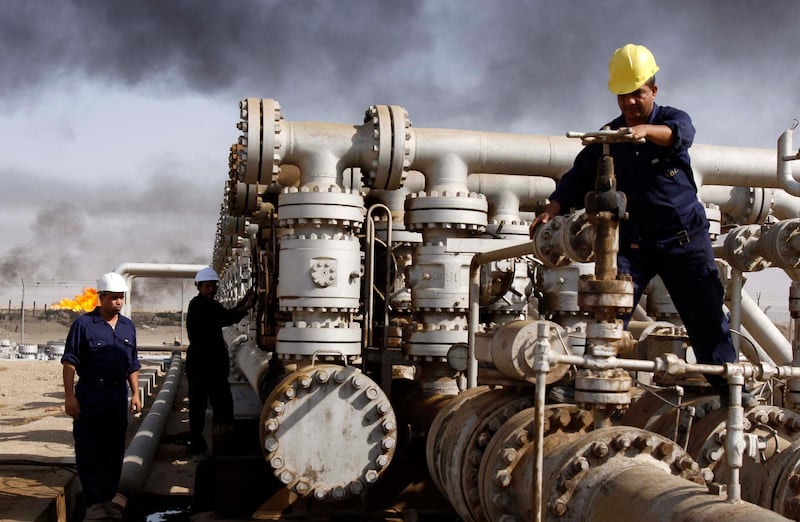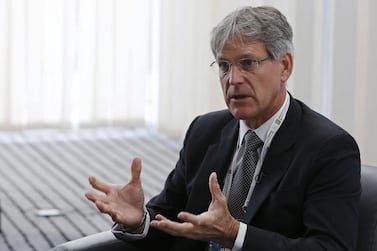Dana Gas is in the process of screening advisers to help it list shares in London as Sharjah-based energy firm revives plans to woo a broader range of international investors to boost the value of its stocks.
“We are a reviewing a list, but we haven’t appointed [advisers] yet,” said Patrick Allman-Ward, chief executive of Dana Gas.
The board of Dana Gas, whose shares currently trade on Abu Dhabi Securities Exchange, has been of the opinion “for some considerable time” that its stocks on the Capital’s bourse are undervalued and it has been "looking to list at the alternative exchanges”, he noted.
“The one at the moment [will] most likely be London Stock Exchange but it is not yet confirmed,” Mr Allman-Ward said. “We are currently investigating all the issues that need to be addressed before such a listing could take place.”
The final decision to list company’s shares on a foreign exchange rest with the board, and much depends on the company’s ability to be ready for alternative listing.
“We are certainly planning to get ready to list this year. But, the actual listing will depend on the market and the market conditions,” he added, without giving further details of the planned deal.
Dana Gas is reviving its plans to the seek a London listing after more than eight years when it first expressed intentions to explore the option in 2011, citing the lower value of the shares at the time. The stock markets in the UAE have seen reduced volume of trade amid a global economic slowdown and volatility during the three year-oil price slump, which began in 2014. Abu Dhabi's benchmark securities index has risen about 6 per cent since the beginning of this year, while Dana Gas shares have climbed about 9 per cent over the period.
In terms of the debt plans, Mr Allman-Ward said Pearl Petroleum, an energy consortium in which Dana and its affiliate Crescent Petroleum holds a majority stake, is looking to raise funding through a range of options including loans, bonds and multilateral financing to fund its investments in the Kurdistan Region of Iraq (KRI).
The size of the bonds could be in the $300m to $400m range (Dh1.47bn), he said, declining to say when the financing deal could be completed.
“It’s a work in progress,” he said, adding that Pearl already raised $150m last year in funds.
Dana Gas last month said that average gas production rose 6 per cent in the first quarter, led by the KRI after increasing capacity at the Khor Mor field in October. The company expects to generate up to $200m in revenues following its latest gas sales agreement in March with the Kurdistan Regional Government.
The consortium partners have announced intention to invest $700m as part of a sales agreement and expansion for the gas assets. As part of the 20-year gas sales agreement with the KRG, the two parties will boost gas production by 63 per cent, or 250 million standard cubic feet per day, to 650 million scf/d by 2021, and later to 900 million scf/d by 2022. Production of condensate from the assets is expected to reach 35,000 bpd by 2022, the company said at the time.
The company on Sunday also reported a 150 per cent rise in first-quarter net income, as lower financing costs and higher income from other sources boosted profitability.
Net profit for the three months to the end of March climbed to $35m, however, revenue for the period fell by 1 per cent to Dh436m, “reflecting decrease in realised hydrocarbon prices during the quarter”, which was partly offset by increased production in the Kurdistan region of Iraq, the company said in a statement to the Abu Dhabi Securities Exchange on Sunday.
Realised prices were lower by 12 per cent during the first quarter this year, eroding Dh29m of the top line. While an increase in production in the Kurdish region added Dh51m to the revenue, it was partly offset by production decline in Egypt and Zora. Realised prices averaged $49 per barrel for condensate and $33 per barrel of oil equivalent for LPG, down from $57 per barrel and $33 per barrel of oil equivalent, respectively in the first three months of 2018.
"We have started the year as we left off in 2018 with a strong operational focus and good financial results," said Mr Allman-Ward. “Our revenues and cash-flow are robust and we more than doubled our net profit.”
The firm, which in the past had struggled to collect receivables on time, has been fully paid the billed $40m amount from KRI. In Egypt, the energy company has received $21m of $30m billed amount in the first quarter, pushing the total receivables to $149m from $140m at the end of last year.








